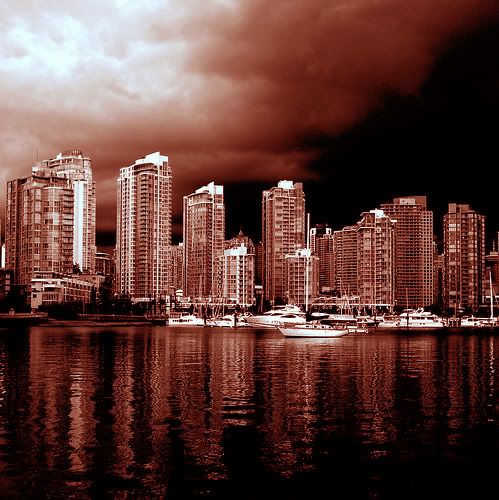property
canada is currently in a bit of a property tug of war right now over the northwest passage, which will no doubt be opening up due to climate change (re: global warming that no politician seems to believe in, especially american ones), and this will become a huge economic lead in for any country that controls the northwest passage. by all rights, if you follow the international rules of the 200 nautical mile limits, canada should have a rightful claim over said passage, but of course since economics are involved, and the potential for great wealth, countries like the united states are claiming otherwise. so now you see canadians doing military exercices up there to exert sovereignty.
now, there won't be an actual war over the northwest passage, but you can bet there will be court rulings. many of them. the legal battle will make the softwood legal battle look like a movie of the week in comparison. the americans knew they were wrong on the softwood lumber side, and they kept losing; repeatedly in the courts, but they kept going at it to stretch it out as long as they could, to help their own lumber producers a little while longer before they lost the edge. but the americans won't roll over so easily on this. anyway, here's an article from the globe and mail (the only worthwhile paper in all of canada by the way. the rest are just rags) about harper strutting up there in the north:
Harper stresses Arctic sovereignty
IQALUIT, Nunavut — Enforcing Canadian sovereignty in the rich offshore waters of the Arctic is a priority because of the vast economic potential of the Far North, Prime Minister Stephen Harper said Saturday.
While some countries, most notably the United States, do not recognize Canada's claim to Arctic waters, Mr. Harper promised during his first visit to the North that Canada will enforce and defend its sovereignty in the region.
"This will become more important in the decades to come because northern oil and gas, minerals and other resources of the northern frontier will become ever more valuable," Mr. Harper told hundreds of residents, politicians and military personnel who came out to greet him at the Nunavut legislature.
Some scientists believe the effects of climate change could open the Northwest Passage, which links the Atlantic and Pacific oceans, to year-round shipping in as little as a decade.
The Northwest Passage is 7,000 kilometres shorter than the current shipping route through the Panama Canal.
Tiny, barren Hans Island in the Arctic Ocean has already been the subject of a diplomatic scuffle with Denmark, as countries awaken to the economic potential of the region.
"The economics and the strategic value of northern resource development are growing more attractive and critical to our nation," Mr. Harper said.
"And trust me, it's not only Canadians who are noticing. It's no exaggeration to say that the need to assert our sovereignty and take action to protect our territorial integrity in the Arctic has never been more urgent."
A major military operation just finished in the Beaufort Sea, while a joint military exercise is getting underway in the northernmost reaches of Canada's claimed 200-nautical-mile — or 370-kilometre — exclusive economic zone in the eastern Arctic.
Mr. Harper said the northern ocean should not be treated differently from the Atlantic or Pacific, where Canada's 200-mile limit is undisputed.
He promised an increased military presence in the North, as well as continued lobbying of the U.S. and other countries that have not yet ratified the international treaty recognizing the exclusive economic zone.
"We think we can make a strong case to the United States that Canada asserting fully its sovereignty is actually in the interests of the entire international community, including the United States itself," Mr. Harper said after speaking to the legislature.
"In the meantime, we continue to take steps to visibly protect and defend our sovereignty in the Canadian Arctic."
Nunavut Premier Paul Okalik welcomed Harper's visit — and his promise of more federal spending.
"I'd love to see more infrastructure so we can stimulate our economy in terms of mineral development and oil and gas," Mr. Okalik said.
But there was no word on the location of a promised deep-sea port that has been the subject of intense lobbying by all three territorial governments.
Duane Smith, president of the Inuit Circumpolar Council, also welcomed the promise of sovereignty over Arctic waters.
"Climate change is easing shipping access to the Northwest Passage and the Arctic Ocean, and is promoting further exploration for oil, gas, and minerals in the North," Mr. Smith said in a statement.
Foreign shipping could pose a threat to that sovereignty, he said.
The prime minister was to visit the military base in Alert, Nunavut, on Sunday before heading to Yellowknife and Whitehorse later in the week.
+Mini.jpg)


|